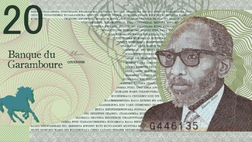Garamburan denier: Difference between revisions
(Created page with "{{Infobox currency | currency_name_in_local = Denieri ya Garambura | image_1 = Garambura 50 Note.png | image_title_1 = Ð20 banknote | alt1 = | iso_code = GDE | iso_number = 7...") |
(→Notes) |
||
| Line 42: | Line 42: | ||
In 2019, the Central Bank of Garambura announced new note designs which would feature an assortment of Garamburan national icons would be entering active mint in mid-2020, with Midzi retaining his portrait on the 20 denier note. The old 1991 set of notes will remain legal tender until December 31, 2020. | In 2019, the Central Bank of Garambura announced new note designs which would feature an assortment of Garamburan national icons would be entering active mint in mid-2020, with Midzi retaining his portrait on the 20 denier note. The old 1991 set of notes will remain legal tender until December 31, 2020. | ||
[[Category:Garambura]] | |||
Revision as of 21:59, 6 January 2020
| Denieri ya Garambura | |
|---|---|
 Ð20 banknote | |
| ISO 4217 | |
| Unit | |
| Plural | Deniers |
| Symbol | Ð |
| Denominations | |
| Banknotes | |
| Freq. used | Ð10, Ð20, Ð50, Ð100, Ð200, Ð500 |
| Coins | |
| Freq. used | Ð1, Ð2, Ð5 |
| Demographics | |
| User(s) | |
| Issuance | |
| Central bank | Central Bank of Garambura |
The denier (veRwizi: denieri; currency sign: Ð; ISO 4217: GDE) is the official currency of Garambura. The denier is the only unit of currency, as it is not divided into any smaller subunits. The smallest amount of issued denier is Ð1, while the largest is Ð500.
Exchange rate
The exchange rate of the Garamburan denier has remained steady over time, owing to the country's growing economy and internal stability, and usually hovers at around 35 to 40 deniers to the Euclo (€). The denier has often been referred to as Bahia's most stable currency.
History
The Garamburan denier replaced the Rwizikuran nhovodiki on January 1, 1970, following a brief transitional agreement period between Garambura and Rwizikuru. The first notes were printed in November 1969 and featured no portrait, but rather a picture of the skyline of Mambiza, on both front and back. The denier was initially pegged to the Gaullican denier upon initial minting.
Coins
The first coins were introduced in 1970 in denominations of 0.1, 0.2, 0.5, 1 and 2 deniers, however the initial coins were only minted between February and June 1970, with the decimal denominations being phased out of legal tender and being replaced with the 5 denier coin. Due to this, 0.1, 0.2 and 0.5 denier coins are extremely rare and are attractive collectors items. New coins began to enter active minting in 1989 with a picture of Kuziva Midzi on the back, and the coat of arms of Garambura on the front, with the same denominations remaining. The 1989 coins are the coins that remain in active use today.
Notes
Banknotes were the first currency to be introduced to Garambura, with the first ones being minted in November 1969 and entering active use at the end of the transitional period on January 1, 1970. Four notes were minted initially, the 5, 10, 20 and 50 denier notes, each featuring a different skyline picture of the largest city, Mambiza, on its front and back, totalling eight pictures. The 5 denier note was yellow, the 10 red, the 20 green and the 50 blue. The 5 denier note exited active minting and was replaced by the 100 denier note (with the 5 denier becoming a coin) in June 1970. In 1991 a new set of notes, introducing new 200 and 500 denier notes, became legal tender. Each note featured a picture of the first President of Garambura Kuziva Midzi on the front and a display of Garamburan culture, economic richness and diversity or landmark on the reverse.
In 2019, the Central Bank of Garambura announced new note designs which would feature an assortment of Garamburan national icons would be entering active mint in mid-2020, with Midzi retaining his portrait on the 20 denier note. The old 1991 set of notes will remain legal tender until December 31, 2020.